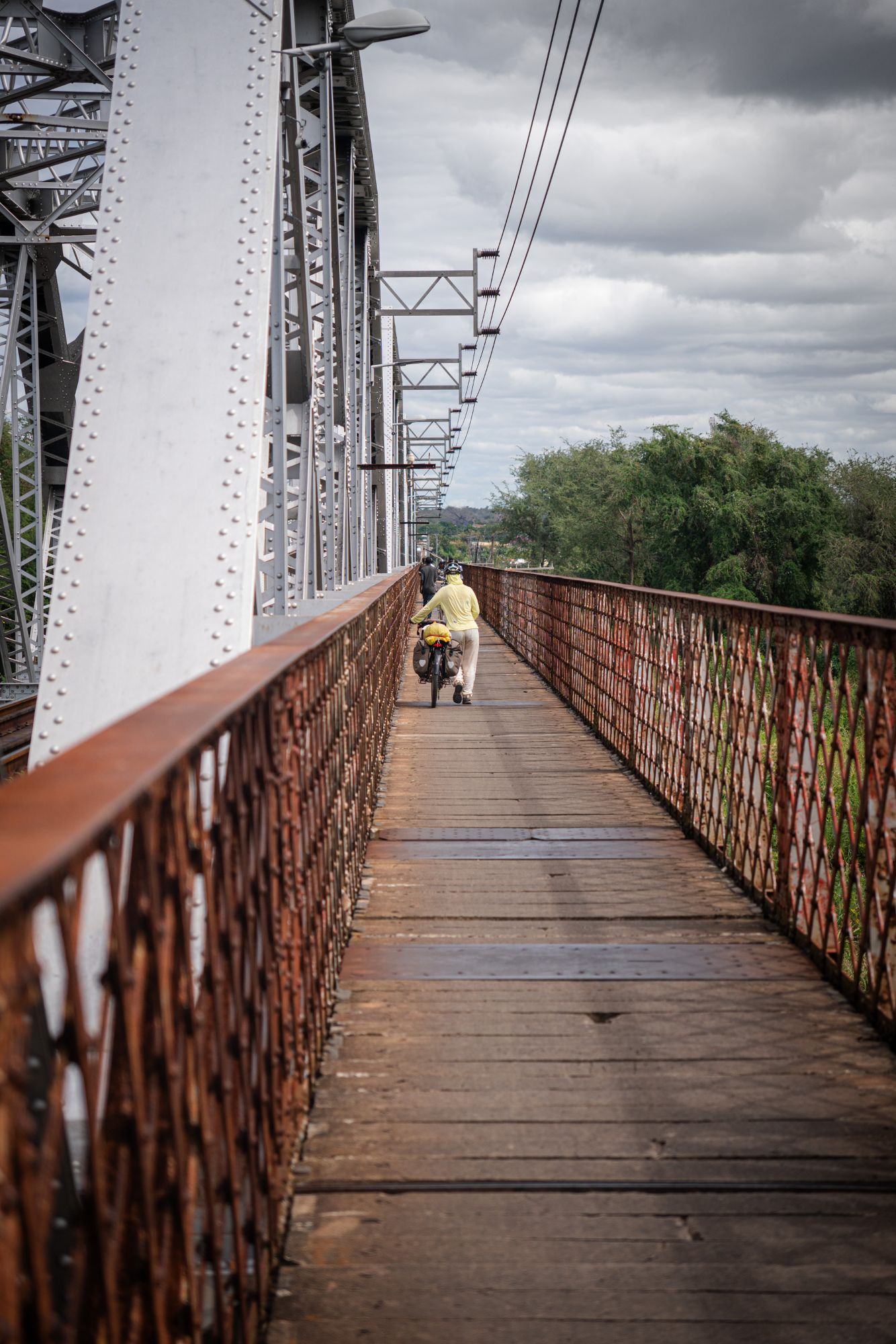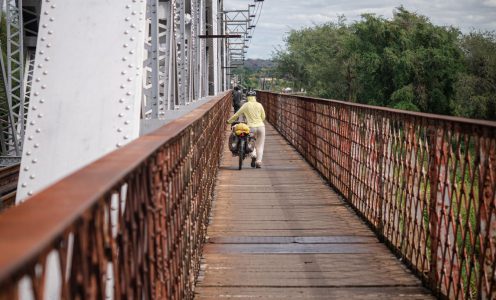We cycle along the train tracks further and further into nomansland. In the border village we overpay for dry mandahzi one last time (4 cents instead of 2), get our Malawian exit stamp and then make our way to the dilapidated Mozambican border post. It seems like years since the last person crossed here and someone has to go and hunt down the immigration officer.
Birds are flying in and out of the building as we complete the registration process and – upon request – tip the guy for doing his job. There isn’t much else we can use our leftover Malawian kwacha for. Still, we decline to change them to Mozambican meticais at the terrible rate the black market guy outside is offering. We’ll be able to withdraw meticais in the next town and we don’t want to give him the satisfaction.
We then leave the paved road behind and plunge into Mozambique. At first glance people here are more shocked than happy to see us and we can’t quite shake the alien feeling. There are no cars on this dirt road and only a couple trucks over 40km. The population density has dropped and there are suddenly stretches without any villages or people walking/cycling in between villages.
Mozambique was a Portuguese colony from the 16th century until independence in 1975. Somewhere we read that nowadays Portuguese is still an official language but not widely spoken anymore. This assumption is quickly corrected as everyone greets us with “bom dia”. Lina tries to put on a Russian accent as she replies in Spanish and it sort of works for lots of interactions. Later on we learn that it’s actually “Não falo português”, not “No hablo Portugés” to convey the blatant fact that we don’t speak Portuguese.
Due to the border formalities and slower progress on the dirt road we arrive in Mutarara (the first town) a little later than we’d like. It’s Sunday and most shops and the bank are closed. The ATM also seems to have taken the day off and promptly swallows Lina’s card as she tries to withdraw money. As she pokes at the screen in vain Ben channels the powers of google translate to explain the situation to the security guard.
At first he just shrugs and tells us that we can pick up the card tomorrow. We kick ourselves that we didn’t exchange the useless kwacha earlier. Not that this would have been enough money to pay for a guest house. The price-performance ratio (Preis-Leistungsverhältnis) is just plain awful in Mozambique. A standard room now costs at least 20€ instead of 5€ as before and usually comes with a broken toilet and without a mosquito net.
While we are still moaning about our misfortune some random guy in flip flops arrives, introduces himself as the bank manager and rescues Lina’s card. Then another random guy arrives, introduces himself as Bob, the teacher (not the builder) and asks if he can help us. Delighted that we finally found someone who speaks English we hire Bob as an unpaid translator. He explains our predicament about the bank to the owner of the cheapest guesthouse in town and secures us a room.
The next morning Ben goes to the bank at 8am and successfully withdraws some tasty money. It then takes at least two hours to sort out our SIM cards. The next obstacle is Dona Ana – a 4km long rickety old railway bridge crossing the mighty Zambezi. Half broken concrete planks from the 1960s wobble underneath our feet. Usually Ben is the one afraid of heights but today Lina regularly breaks into tears of panic as the adrenaline floods her system.
After almost an hour of gasps, shrieks and internal cussing we finally reach the other side in one piece. By the time we finish lunch (and negotiate the price down by half) it’s 1pm and we still have 60km of dirt road ahead of us. Being more early bird cyclists this takes a heavy mental toll. The shadows are getting quite long as we roll into the run-down Pensão, hunt for some dinner and a well deserved can of coke.
Thankfully the next day we have something to look forward to. A short 30km cycle on a paved road with very little traffic to a nice reasonably priced forest lodge. Now this is the kind of holiday we envisioned. We book ourselves in for three nights in a snug little cabin with bats in the shower and nyala, suni, red duiker, crested guinea fowl, mongoose, kudu and samanga monkeys as neighbors.
We meet Pat and Ant (the Zimbabwean owners of the lodge) who have been living in Mozambique for 30 years. They also run a sawmill and Ant happily gives us a tour. We are fascinated how old, decommissioned Portuguese turning machinery is used here to transform even the smallest off-cut of wood into something a European would pay a ton of money for.
On our days off we explore the forest, learn about (and forget instantly) the name of the tree that you can drink from and the other tree with blood red sap. Every meal comes with a big chunk of butter and toasted banana bread for desert (slathered in yet more butter). We share a glass of wine with Ant by the fire and he recommends us a good psychiatrist to treat “what ever it is that prompted a slimy limey and a German lass to cycle through Africa”.
We often wish that we could learn about a country from the “local” locals. But usually the language or cultural barrier prevents that. People like Pat and Ant are a great second best source of information and we add another couple to the list of amazing interactions we’ve had so far. Thoroughly fed and rested we set off again. It feels like we’ve finally arrived in Mozambique.







































Love the illustration. Miss you two and glad to see that you are having some memorable experiences. The border crossing made me laugh!
Miss you too! And Malawi 🇲🇼
makes me want to be there with you, perhaps not the tricky cycling and negotiating bits, but this is a wonderful place you are staying in now. Enjoy!!!
Thank you Paula, you’re welcome to join us any time. We’re slowly learning to enjoy ourselves.
I know I don’t comment often, but we absolutely love following your travels through your blog posts & amazing photos. What an adventure! What’s Lina drinking from the tree branch?
Thanks Kim. I’m drinking water. The guide explained that bush pigs eat these trees during the dry season. Didn’t see any though, sadly.